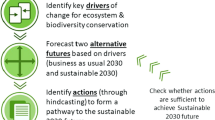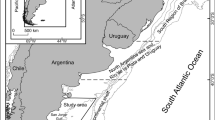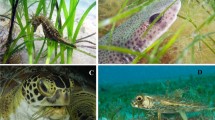Abstract
Fisheries around the world are declining due to growing anthropogenic pressures including climate change and overexploitation. Understanding how small-scale fishers respond to this unprecedented challenge is critical for developing more effective management strategies in vulnerable socio-ecological systems. While considerable research is focused on adaptation to change in marine contexts, greater attention is urgently needed on regionally important but often neglected inland fisheries. This study analyzes the adaptation intentions of littoral fishers on Lake Tanganyika, a biodiversity hotspot and one of the largest inland fisheries in Africa. Data were collected through in-person surveys of 154 littoral fishers across 11 major landing sites in Tanzania. Based on the Theory of Planned Behavior, we identified and tested 15 individual and site-level factors as potential indicators of adaptation intentions to a hypothetical 50% decline in catch. Our results show that fishers with other (non-fishing) primary livelihoods are more likely to adapt in ways that decrease fishing pressure, increase income, and are supported by family and friends. Homeowners were also more likely to adapt in ways that lessen fishing pressure. Our findings highlight the importance of fostering regional adaptation strategies that increase primary livelihood alternatives and capital outside the fishery, while discouraging investment in adaptations focused on increasing catch amount or fishing income.



Similar content being viewed by others
References
Adger WN, Huq S, Brown K, Conway D, Hulme M (2003) Adaptation to climate change in the developing world. Prog Dev Stud 3:179–195. https://doi.org/10.1191/1464993403ps060oa
Ajzen I (1991) The theory of planned behavior. Organ Behav Hum Decis Process 50:179–211. https://doi.org/10.1016/0749-5978(91)90020-T
Ajzen I (2002) Perceived behavioral control, self-efficacy, locus of control, and the theory of planned behavior. J Appl Soc Psychol 32:665–683. https://doi.org/10.1111/j.1559-1816.2002.tb00236.x
Allison EH, Ellis F (2001) The livelihoods approach and management of small-scale fisheries. Mar Policy 25:377–388. https://doi.org/10.1016/S0308-597X(01)00023-9
Andrew NL, Béné C, Hall SJ, Allison EH, Heck S, Ratner BD (2007) Diagnosis and management of small-scale fisheries in developing countries. Fish Fish 8:227–240. https://doi.org/10.1111/j.1467-2679.2007.00252.x
Badjeck MC, Allison EH, Halls AS, Dulvy NK (2010) Impacts of climate variability and change on fishery-based livelihoods. Mar Policy 34:375–383. https://doi.org/10.1016/j.marpol.2009.08.007
Belhabib D, Lam VW, Cheung WW (2016) Overview of West African fisheries under climate change: impacts, vulnerabilities and adaptive responses of the artisanal and industrial sectors. Mar Policy 71:15–28. https://doi.org/10.1016/j.marpol.2016.05.009
Cinner JE, Daw T, McClanahan TR (2008) Socioeconomic factors that affect artisanal fishers’ readiness to exit a declining fishery. Conserv Biol 23:124–130. https://doi.org/10.1111/j.1523-1739.2008.01041.x
Cinner JE, Folke C, Daw T, Hicks CC (2011) Responding to change: using scenarios to understand how socioeconomic factors may influence amplifying or dampening exploitation feedbacks among Tanzanian fishers. Glob Environ Chang 21:7–12. https://doi.org/10.1016/j.gloenvcha.2010.09.001
Cinner JE, Huchery C, Hicks CC, Daw TM, Marshall N, Wamukota A, Allison EH (2015) Changes in adaptive capacity of Kenyan fishing communities. Nat Clim Chang 5:872–876. https://doi.org/10.1038/nclimate2690
Cinner JE, Adger WN, Allison EH, Barnes ML, Brown K, Cohen PJ, Gelcich S, Hicks CC, Hughes TP, Lau J, Marshall NA, Morrison TH (2018) Building adaptive capacity to climate change in tropical coastal communities. Nat Clim Chang 8:117–123. https://doi.org/10.1038/s41558-017-0065-x
Cohen AS, Gergurich EL, Kraemer BM, McGlue MM, McIntyre PB, Russell JM, Simmons JD, Swarzenski PW (2016) Climate warming reduces fish production and benthic habitat in Lake Tanganyika, one of the most biodiverse freshwater ecosystems. Proc Natl Acad Sci U S A 113:9563–9568. https://doi.org/10.1073/pnas.1603237113
Coulter GW (ed) (1991) Lake Tanganyika and its life. Oxford University Press, Oxford
Coulter GW (1994) Lake Tanganyika. In: Martens K, Godddeeris B, Coulter G (eds) Speciation in ancient lakes. Adv Limnol 44:13–18
Coulthard S (2008) Adapting to environmental change in artisanal fisheries—insights from a South Indian lagoon. Glob Environ Chang 18:479–489. https://doi.org/10.1016/j.gloenvcha.2008.04.003
Coulthard S (2009) Adaptation and conflict within fisheries: insights for living with climate change. In: Adger WN, Lorenzoni I, O’Brian KL (eds) Adapting to climate change: thresholds, values and governance. Cambridge University Press, Cambridge, pp 255–269
Coulthard S, Johnson D, McGregor JA (2011) Poverty, sustainability and human wellbeing: a social wellbeing approach to the global fisheries crisis. Glob Environ Chang 21:453–463. https://doi.org/10.1016/j.gloenvcha.2011.01.003
Crandall CA, Garlock TM, Lorenzen K (2018) Understanding resource-conserving behaviors among fishers: barotrauma mitigation and the power of subjective norms in Florida’s reef fisheries. N Am J Fish Manag 38:271–280. https://doi.org/10.1002/nafm.10041
Darwall W, Smith K, Allen D, Holland R, Harrison I, Brooks E (eds) (2011) The diversity of life in African freshwaters: underwater, under threat. IUCN, Cambridge
Daw T, Adger WN, Brown K, Badjeck MC (2009) Climate change and capture fisheries: potential impacts, adaptation and mitigation. In: Cochrane K, De Young C, Soto D, Bahri T (eds) Climate change implications for fisheries and aquaculture: overview of current scientific knowledge. FAO Fisheries and Aquaculture Technical Paper 530:107–150
Daw TM, Cinner JE, McClanahan TR, Brown K, Stead SM, Graham NA, Maina J (2012) To fish or not to fish: factors at multiple scales affecting artisanal fishers’ readiness to exit a declining fishery. PLoS One 7:e31460. https://doi.org/10.1371/journal.pone.0031460
Ditton RB, Hunt KM (2001) Combining creel intercept and mail survey methods to understand the human dimensions of local freshwater fisheries. Fish Manag Ecol 8:295–301. https://doi.org/10.1111/j.1365-2400.2001.00260.x
Eakin H, Tucker CM, Castellanos E, Diaz-Porras R, Barrera JF, Morales H (2014) Adaptation in a multi-stressor environment: perceptions and responses to climatic and economic risks by coffee growers in Mesoamerica. Environ Dev Sustain 16:123–139. https://doi.org/10.1007/s10668-013-9466-9
Gurney GG, Cinner J, Ban NC, Pressey RL, Pollnac R, Campbell SJ, Tasidjawa S, Setiawan F (2014) Poverty and protected areas: an evaluation of a marine integrated conservation and development project in Indonesia. Glob Environ Chang 26:98–107. https://doi.org/10.1016/j.gloenvcha.2014.04.003
Holling CS (1973) Resilience and stability of ecological systems. Annu Rev Ecol Syst 4:1–23. https://doi.org/10.1146/annurev.es.04.110173.000245
Hori M, Gashagaza MM, Nshombo M, Kawanabe H (1993) Littoral fish communities in Lake Tanganyika: irreplaceable diversity supported by intricate interactions among species. Conserv Biol 7:657–666. https://doi.org/10.1046/j.1523-1739.1993.07030657.x
Janssen MA, Ostrom E (2006) Resilience, vulnerability, and adaptation: a cross-cutting theme of the International Human Dimensions Programme on Global Environmental Change. Glob Environ Chang 16:237–239. https://doi.org/10.1016/j.gloenvcha.2006.04.003
Katikiro R, Deepananda KA, Macusi E (2015) Interplay between perceived changes in fishery and social structures in Tanzanian coastal fishing communities. Fish Res 164:249–253. https://doi.org/10.1016/j.fishres.2014.12.009
Kotchen MJ, Young OR (2007) Meeting the challenges of the anthropocene: towards a science of coupled human-biophysical systems. Glob Environ Chang 17:149–151. https://doi.org/10.1016/j.gloenvcha.2007.01.001
Lynch AJ, Cowx IG, Fluet-Chouinard E, Glaser SM, Phang SC, Beard TD, Bower SD, Brooks JL, Bunnell DB, Claussen JE, Cooke SJ, Kao Y-C, Lorenzen K, Myers BJE, Reid AJ, Taylor JJ, Youn S (2017) Inland fisheries–invisible but integral to the UN Sustainable Development Agenda for ending poverty by 2030. Glob Environ Chang 47:167–173. https://doi.org/10.1016/j.gloenvcha.2017.10.005
Martin SM, Lorenzen K, Bunnefeld N (2013) Fishing farmers: fishing, livelihood diversification and poverty in rural Laos. Hum Ecol 41:737–747. https://doi.org/10.1007/s10745-013-9567-y
McClanahan T, Allison EH, Cinner JE (2015) Managing fisheries for human and food security. Fish Fish 16:78–103. https://doi.org/10.1111/faf.12045
McGoodwin JR (1990) Crisis in the world’s fisheries: people, problems, and policies. Stanford University Press, Stanford
Miller ZD (2017) The enduring use of the theory of planned behavior. Hum Dimens Wildl 22:583–590. https://doi.org/10.1080/10871209.2017.1347967
Mölsä H, Reynolds JE, Coenen EJ, Lindqvist OV (1999) Fisheries research towards resource management on Lake Tanganyika. Hydrobiologia 407:1–24. https://doi.org/10.1023/A:1003712708969
Mushagalusa CD, Nshombo M, Lushombo M (2014) Littoral fisheries on Cichlidae (Pisces) from the northwestern part of Lake Tanganyika, East Africa. Aquat Ecosyst Health Manag 17:41–51. https://doi.org/10.1080/14634988.2014.883893
Mwima HK (2014) Environmental governance dimensions and perspectives for three transboundary African lakes. Aquat Ecosyst Health Manag 17:97–102. https://doi.org/10.1080/14634988.2014.873332
Ndhlovu N, Saito O, Djalante R, Yagi N (2017) Assessing the sensitivity of small-scale fishery groups to climate change in Lake Kariba, Zimbabwe. Sustainability 9:2209. https://doi.org/10.3390/su9122209
Niles MT, Brown M, Dynes R (2016) Farmer’s intended and actual adoption of climate change mitigation and adaptation strategies. Clim Chang 135:77–295. https://doi.org/10.1007/s10584-015-1558-0
O’Reilly CM, Alin SR, Plisnier PD, Cohen AS, McKee BA (2003) Climate change decreases aquatic ecosystem productivity of Lake Tanganyika, Africa. Nature 424:766–768. https://doi.org/10.1038/nature01833
Palsson G, Szerszynski B, Sörlin S, Marks J, Avril B, Crumley C, Hackmann H, Holm P, Ingram J, Kirman A, Buendía, Weehuizen R (2013) Reconceptualizing the “Anthropos” in the Anthropocene: integrating the social sciences and humanities in global environmental change research. Environ Sci Pol 28:3–13. https://doi.org/10.1016/j.envsci.2012.11.004
Paukert CP, Glazer BA, Hansen GJ, Irwin BJ, Jacobson PC, Kershner JL, Shuter BJ, Whitney JE, Lynch AJ (2016) Adapting inland fisheries management to a changing climate. Fisheries 41:374–384. https://doi.org/10.1080/03632415.2016.1185009
Perret SR, Shivakoti GP (2013) Fishing farmers or farming fishers? Fishing typology of inland small-scale fishing households and fisheries management in Singkarak Lake, West Sumatra, Indonesia. Environ Manag 52:85–98. https://doi.org/10.1007/s00267-013-0050-8
Petit P, Shipton T (2012) IUU Fishing on Lake Tanganyika. Smart Fish and the Indian Ocean Commission: programme for the implementation of a Regional Fisheries Strategy for the Eastern and Southern Africa and Indian Ocean Region, SF/2012/15.
Pollnac RB, Pomeroy RS, Harkes IH (2001) Fishery policy and job satisfaction in three southeast Asian fisheries. Ocean Coast Manag 44:531–544. https://doi.org/10.1016/S0964-5691(01)00064-3
Redclift M (1992) Sustainable development and global environmental change. Glob Environ Chang 2:32–42. https://doi.org/10.1016/0959-3780(92)90034-5
Salas S, Gaernter D (2004) The behavioral dynamics of fishers: management implications. Fish Fish 5:153–167. https://doi.org/10.1111/j.1467-2979.2004.00146.x
Salzburger W, Van Bocxlaer B, Cohen AS (2014) Ecology and evolution of the African Great Lakes and their faunas. Annu Rev Ecol Evol Syst 45:519–545. https://doi.org/10.1146/annurev-ecolsys-120213-091804
Savo V, Morton C, Lepofsky D (2017) Impacts of climate change for coastal fishers and implications for fisheries. Fish Fish 18:877–889. https://doi.org/10.1111/faf.12212
Schafer JL, Graham JW (2002) Missing data: our view of the state of the art. Psychol Methods 7:147–177. https://doi.org/10.1037/1082-989X.7.2.147
Senapati S, Gupta V (2017) Socio-economic vulnerability due to climate change: deriving indicators for fishing communities in Mumbai. Mar Policy 76:90–97. https://doi.org/10.1016/j.marpol.2016.11.023
Shaffril HAM, Samah AA, D’Silva JL (2017) Climate change: social adaptation strategies for fishermen. Mar Policy 81:256–261. https://doi.org/10.1016/j.marpol.2017.03.031
Smit B, Wandel J (2006) Adaptation, adaptive capacity and vulnerability. Glob Environ Chang 16:282–292. https://doi.org/10.1016/j.gloenvcha.2006.03.008
Smith LE, Khoa SN, Lorenzen K (2005) Livelihood functions of inland fisheries: policy implications in developing countries. Water Policy 7:359–383. https://doi.org/10.2166/wp.2005.0023
The Nature Conservancy (n.d.) Western Tanzania: The Tuungane Project. Retrieved from https://www.nature.org/en-us/about-us/where-we-work/africa/stories-in-africa/tuungane-project/. Accessed 9 Oct 2018
Tierney JE, Mayes MT, Meyer N, Johnson C, Swarzenski PW, Cohen AS, Russell JM (2010) Late-twentieth-century warming in Lake Tanganyika unprecedented since AD 500. Nat Geosci 3:422–425. https://doi.org/10.1038/ngeo865
Van der Knaap M, Katonda KI, De Graaf GJ (2014) Lake Tanganyika fisheries frame survey analysis: assessment of the options for management of the fisheries of Lake Tanganyika. Aquat Ecosyst Health Manag 17:4–13. https://doi.org/10.1080/14634988.2014.882733
Verburg P, Hecky RE, Kling H (2003) Ecological consequences of a century of warming in Lake Tanganyika. Science 301:505–507. https://doi.org/10.1126/science.1084846
von Lindern E, Mosler HJ (2014) Insights into fisheries management practices: using the theory of planned behavior to explain fish stocking among a sample of Swiss anglers. PLoS One 9:e115360. https://doi.org/10.1371/journal.pone.0115360
Welcomme RL, Cowx IG, Coates D, Béné C, Funge-Smith S, Halls A, Lorenzen K (2010) Inland capture fisheries. Philos Trans R Soc Lond B Biol Sci 365:2881–2896. https://doi.org/10.1098/rstb.2010.0168
Wheeler S, Zuo A, Bjornlund H (2013) Farmers’ climate change beliefs and adaptation strategies for a water scarce future in Australia. Glob Environ Chang 23:537–547. https://doi.org/10.1016/j.gloenvcha.2012.11.008
Yuan YC (2010) Multiple imputation for missing data: concepts and new development (version 9.0), vol 49. SAS Institute Inc, Rockville, pp 1–11
Yzer M (2012) Perceived behavioral control in reasoned action theory: a dual-aspect interpretation. Ann Am Acad Polit Soc Sci 640:101–117. https://doi.org/10.1177/0002716211423500
Zhang T, Bakar S (2017) The implications of local perceptions, knowledge, and adaptive strategies for adaptation planning in coastal communities of Zanzibar. Environ Justice 10:112–118. https://doi.org/10.1089/env.2016.0031
Acknowledgments
We are grateful to Glenn Israel, Kai Lorenzen, Anna Peterson, James Colee, and the Human Dimensions of Wildlife lab at UF for providing valuable guidance and feedback, and to two anonymous reviewers for their helpful comments on this paper. We also thank CLEAT and TAFIRI-Kigoma for collaborating on this study, and in particular Joan Brehm, Huruma Mgana, Emmanual Sweke, Ishmael Kimirei, Julieth Mosille, Julius Assam, Tumaini Kamulali, Masanja Bahati, George Kazumbe, Peter Limbu, Craig Lesher, and Colin Apse.
Funding
This material is based upon work supported by the National Science Foundation Graduate Research Fellowship under grant no. DGE-1842473; the University of Florida Program for Studies in Tropical Conservation; the University of Florida Tropical Conservation and Development Program; the University of Florida Center for African Studies; and the Danish Ministry of Foreign Affairs/DANIDA.
Author information
Authors and Affiliations
Corresponding author
Ethics declarations
This study meets the ethical standards of the University of Florida’s Institutional Review Board, including procedures for the informed consent of human participants. It was conducted with approval from the Tanzania Commission for Science and Technology (COSTECH) under research permit no. 2017-101-HL-2017-85.
Conflict of interest
The authors declare that they have no conflicts of interest.
Additional information
Editor: Debbie Ley
Publisher’s note
Springer Nature remains neutral with regard to jurisdictional claims in published maps and institutional affiliations.
Electronic supplementary material
ESM 1
(DOCX 14 kb)
Rights and permissions
About this article
Cite this article
Lowe, B.S., Jacobson, S.K., Anold, H. et al. Adapting to change in inland fisheries: analysis from Lake Tanganyika, East Africa. Reg Environ Change 19, 1765–1776 (2019). https://doi.org/10.1007/s10113-019-01516-5
Received:
Revised:
Accepted:
Published:
Issue Date:
DOI: https://doi.org/10.1007/s10113-019-01516-5




